by Ingrid Robeyns on July 31, 2024
We just got home from a wonderful trip to Prague, Budapest, and Krakow. All three cities have a rich history of Jewish communities, and one can visit synagogues, musea, and Jewish cemeteries. We visited a number of them, including the very impressive Dohány Street Synagogue in Budapest, which was once the largest synagogue in the world (now still the largest in Europe).
To my surprise, Google maps blocks the online posting of reviews of several of those places. My reviews of the Dohány Street Synagogue in Budapest and of the Spanish Synagogue in Prague were published immediately (and there have been many other reviews of those two places published in the last week, including some negative). But my reviews of the Pinkas Synagogue in Prague, and of the 5th District Restaurant nearby, have not been put online.
When I submitted my reviews and they instantly got rejected, the explanation that Google (automatically) provides was the following: “This place is currently more likely to receive content that violates Google’s policies. To prevent this, Google has turned off posting.”
This explanation is problematic for two reasons. The first is that a few other reviews of those two places did get published over the last week; they were all five stars-reviews, which is the top rating on Google Map reviews. So clearly posting hasn’t been turned off for everyone, as some positive reviews got through. The second reason this stated policy is problematic is that I was troubled by both places, and was prevented from sharing with potential future visitors the reasons I was troubled. [click to continue…]
by Ingrid Robeyns on March 29, 2023
Earlier this week, I was at a meeting to discuss the question whether my university should cut its ties with the fossil industry, or else impose additional conditions on working with partners from fossil industries. There was quite some agreement that the university should think hard about spelling out and endorsing a moral framework, and based on those values and moral principles work out what (if any) forms of collaboration would remain legitimate in the future. This led our vice-chancellor to ask the question what else such moral framework would imply for university staff. “Should we perhaps completely stop flying?”, he asked.
And then there is, once again, a very depressing IPCC report and we must radically change our modes of production and consumption if we want to leave our children (and our older selves) a planet that will remain safe for the human species. And it’s not just about the future, but about the present: urgent action is needed to lower the number of the deadly climate-related events that we have seen over the last years, from increases in wildfires to deadly floodings – that led poor people, who have made almost zero contribution to this problem, lose their livelihoods, and many simply died. So to me it seems obvious that what we change in response to climate change is a very urgent moral question.
Hence the question: Do academics fly too much? Should we simply stop flying at all?
[click to continue…]
by Chris Bertram on November 16, 2022
I discovered recently that my late Aunt Mary, who was in her time PA to the Postmaster General and a crack typist, had transcribed a letter from a distant relative of ours recounting a journey in 1865 from London to Aden (part of a journey to India). The letter seems sufficiently interesting to post here at Crooked Timber. Among the points of interest are the speed of the journey to Marseilles (remember, we are only 35 years into the railway era), seeing de Lesseps in Egypt — who has constructed the “Sweet Water Canal” (the Ismaïlia Canal) and has yet to complete the Suez Canal), impressions of the various places he passed through, and the tragic funeral of a young man who has died of drink. But much else besides. I’ve digitized by using the OCR on my phone and have checked the various oddities and spellings, so this should be an accurate reproduction.
S.S. Mooltan, Red Sea
22 December 1865
My dear Nelly,
I promised Mamma that I would send you all a letter but the old “Ripon” made such bad weather of it that although an old sailor I could not write very comfortably on board her and therefore all the writing that I did on board was either on business or to your dear Mother. We are now in a very fine large ship and as the weather is fine the sea very smooth and I have a cabin to myself, I can write in comfort and without being disturbed. You will I am sure like to have a kind of log or journal of my proceeding since I left you all on Monday and I will try and recollect the places that I have passed through and any little incidents that may be interesting and jot them down on paper to post at Aden, and although addressed to your dear Nelly you must understand that this letter is meant for all my dear children, and as I shall probably not write to your Mother from Aden, why, this will suffice to let her know also that I am in health and as happy as I can be while away from all I love.
[click to continue…]
by Chris Bertram on September 28, 2015
I spent a good chunk of yesterday reading the second half of Lynsey Addario’s [*It’s What I Do: A Photographer’s Life of Love and War*](http://itswhatidobook.com/). I’d been reading it a few pages at a time for the previous week, but then I just got carried away and had to read right to the end. As CT readers know, I’m keenly interested in photography, but it is also the case that reading accounts from war photographers (and seeing their pictures) has changed the way I think about war and conflict.
After September 11th 2001, the blogosphere erupted into being a thing, and several hundred part-time pundits spent a good period of their time arguing with one another about Afghanistan, Iraq, the Islamic world, military tactics and a thousand other things they knew virtually nothing about. Some of them are typing still. I penned what I now regard as an unfortunate essay on just war theory and Afghanistan, unfortunate because there I was applying abstract principles to conflicts where I hadn’t a clue about the human reality. I hope I’d be more careful and less reductive today, and that’s partly as a result of people like the photographer Don McCullin, and his autobiography *Unreasonable Behaviour*. I’d heard of Addario’s book a few months ago, but then I saw some of her pictures at a festival of documentary photography in Perpignan, France, and decided I had to read it.
[click to continue…]
by Eszter Hargittai on July 11, 2015
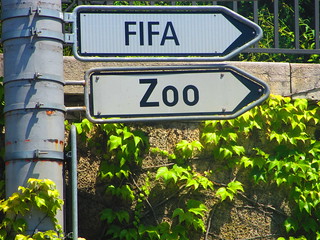 I was in Zurich last week where my hosts kindly took me to a very nice restaurant on Zürichberg, a hill that offers pretty views and a peaceful environment of fields and forests. In addition to the garden restaurant of the Hotel Zurichberg, there is a terrace as well with even better views. It turns out, Zürichberg is host to all sorts of attractions: FIFA’s headquarters, the Zurich Zoo and a beautiful cemetery where James Joyce is buried (as pointed out by Daniel in his insightful reflections on Switzerland last summer).
I was in Zurich last week where my hosts kindly took me to a very nice restaurant on Zürichberg, a hill that offers pretty views and a peaceful environment of fields and forests. In addition to the garden restaurant of the Hotel Zurichberg, there is a terrace as well with even better views. It turns out, Zürichberg is host to all sorts of attractions: FIFA’s headquarters, the Zurich Zoo and a beautiful cemetery where James Joyce is buried (as pointed out by Daniel in his insightful reflections on Switzerland last summer).
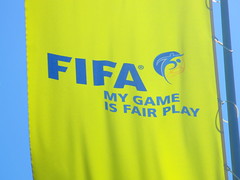 FIFA’s headquarters greet you with three flags, the middle one proudly proclaiming “My Game is Fair Play.” It’s good that they cleared that up. I was curious to see a sculpture peeking out from behind some trees, but as we tried to enter the FIFA grounds, a security guard stopped us explaining that unless we were children playing in the soccer match nearby or their parents, we could not proceed. Nearby was a guard with a weapon as well, not a common occurrence in Zurich.
FIFA’s headquarters greet you with three flags, the middle one proudly proclaiming “My Game is Fair Play.” It’s good that they cleared that up. I was curious to see a sculpture peeking out from behind some trees, but as we tried to enter the FIFA grounds, a security guard stopped us explaining that unless we were children playing in the soccer match nearby or their parents, we could not proceed. Nearby was a guard with a weapon as well, not a common occurrence in Zurich.
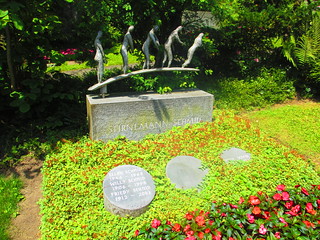 The highlight of this area for me was Friedhof Fluntern, a most charming cemetery, if that word is appropriate given the context (as aptly noted by a reviewer on TripAdvisor, “how do you rate a cemetery?”). Given the Swiss context, it is not a huge surprise that the grounds are very orderly. But there is more to it. It feels more like a garden than a cemetery. You can imagine spending time there to get away from the hustle and bustle of the city. A colleague even noted that he sometimes goes there to read. The headstones move past the usual venturing into the whimsy and artistic. The cemetery is on a hill, which adds to its character. I enjoyed going from row to row trying to peek into the lives of the people buried there through their names, the dates and notes on the stones, and the little sculptures honoring them. See more of my Friedhof Fluntern photos here.
The highlight of this area for me was Friedhof Fluntern, a most charming cemetery, if that word is appropriate given the context (as aptly noted by a reviewer on TripAdvisor, “how do you rate a cemetery?”). Given the Swiss context, it is not a huge surprise that the grounds are very orderly. But there is more to it. It feels more like a garden than a cemetery. You can imagine spending time there to get away from the hustle and bustle of the city. A colleague even noted that he sometimes goes there to read. The headstones move past the usual venturing into the whimsy and artistic. The cemetery is on a hill, which adds to its character. I enjoyed going from row to row trying to peek into the lives of the people buried there through their names, the dates and notes on the stones, and the little sculptures honoring them. See more of my Friedhof Fluntern photos here.
It was too hot to proceed to the Zoo, but having later read that they have Galapagos giant tortoises, I was bummed by my decision to skip it and will be sure to visit next time I am in town.
To get to Zürichberg, take Tram 6 from Central to Zoo, which is a 2-minute walk heading east from the main train station, which is ten minutes from the airport by train. Zurich offers day tickets for its entire public transportation system. The 24 or 72-hour ZürichCARD can also be very beneficial if you plan to visit numerous attractions.
by Belle Waring on July 7, 2015
I have a few observations about Asia, and living here and also traveling to nations other than Singapore. I have been mulling them over on this trip alone as I have no one to talk to (except everyone I meet, and it’ll astonish you to know I am a friendly, chatty person. Well, the friendly might surprise you if you think of me as a harpy swooping to scourge my foes with a whip of venom. In truth I smile at strangers, and it took me some little time living in NYC before I could repress the drive to meet with my gaze every person I pass, a practice that actually impedes walking in Savannah, as one frequently knows the person and cannot, under any circumstance, walk past them without speaking briefly. My children think I am “scary,” a not unadulterated good character reference. By this they mean I have a mean glare on me, but that’s part of a mother’s job. If you can’t get somebody to stop fooling around just by looking at them sideways, you have failed to cultivate your maternal powers.) I have been loath to commit them–these ideas you forgot I was talking about just now–to pixels because I feel they are disorganized and perhaps it is not even possible to unwind the tangled skein. However, you are always kind in accepting my scattered thoughts as continuous writing and thus encouraged I will proceed.
[click to continue…]
by Eszter Hargittai on January 19, 2015
 In honor of Martin Luther King, Jr. Day in the US, I am posting some photos I took at the MLK Memorial in DC when I visited there last Fall. There is no shortage of critical commentary about the memorial from when it was dedicated a few years ago. I wasn’t aware of these when I visited, which is probably a good thing as it would have tainted my visit, not necessarily justifiably as far as I’m concerned. (If you feel you must add your critical thoughts in the comments, I just ask that you try to be original.)
In honor of Martin Luther King, Jr. Day in the US, I am posting some photos I took at the MLK Memorial in DC when I visited there last Fall. There is no shortage of critical commentary about the memorial from when it was dedicated a few years ago. I wasn’t aware of these when I visited, which is probably a good thing as it would have tainted my visit, not necessarily justifiably as far as I’m concerned. (If you feel you must add your critical thoughts in the comments, I just ask that you try to be original.)
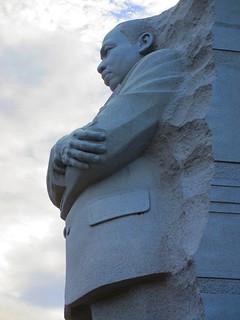 I admit that it wasn’t a particularly targeted visit on my part. I was in town for a conference and had an afternoon to roam the city. I had been walking for hours (winding my way back from the Thomas Sweet in Georgetown to the Mall) and found myself walking on Independence Ave SW when I spotted signs to the MLK Memorial. Once I saw the signs, I knew I wanted to see it.
I admit that it wasn’t a particularly targeted visit on my part. I was in town for a conference and had an afternoon to roam the city. I had been walking for hours (winding my way back from the Thomas Sweet in Georgetown to the Mall) and found myself walking on Independence Ave SW when I spotted signs to the MLK Memorial. Once I saw the signs, I knew I wanted to see it.
I was lucky in the timing of my visit. It was early evening on a weekday, 9/11 to be precise. There was almost no one else around. This made a difference as I found the place perfect for contemplation. I entered from the northwest, which worked well as I appreciated walking through the rocks not knowing exactly what to expect.
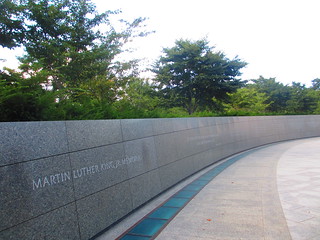 After looking at MLK’s figure and taking in the scene of the Jefferson Memorial that is in the statue’s line of sight, I walked from quote to quote and reflected on each, especially given the Ferguson events still fresh in memory. I was able to do all of this almost in solitude. The early evening light added to the mood.
After looking at MLK’s figure and taking in the scene of the Jefferson Memorial that is in the statue’s line of sight, I walked from quote to quote and reflected on each, especially given the Ferguson events still fresh in memory. I was able to do all of this almost in solitude. The early evening light added to the mood.
If you can, I recommend visiting early evening or perhaps early morning on a weekday when you may have the place mostly to yourself. Be sure to give yourself time, it wouldn’t have been the same had I felt rushed.
by Daniel on November 18, 2014
And the travelogue continues – this chapter covers my family’s visits to Jordan and to Sri Lanka. The next episode will take us to a seaside cottage in Bali …
[click to continue…]
by Daniel on September 15, 2014
The second stage of my travelogue finds me and the family in the French Alps, heading to the Italian lakes. Shortly after finishing this, I set off for Venice to take a ferry down the Adriatic …
[click to continue…]
by Belle Waring on September 5, 2014
September! When I made a monthly music-themed mix, September won. At this very moment I’m obsessively listening to this song, “Don’t Wait,” by Maipei. John finds the vocals too computer-processed, but it’s important to note that they are too computer-processed in an Air-song-from-1998 way, and not in a T-Pain-song-from-2008 way.
But obviously when September rolls around, this ticking, percussive guitar/synth/O HAI ITS THE HORNZ thing comes to mind. Firstly, are those, like, daishikis from outer space, or Chinese-inspired sequined outfits from outer space, what say ye? Secondly, John notes no one goes for the balding afro anymore. A man in that position nowadays would shave his head. Not Maurice White. He has the sexual self-confidence to rock this balding afro with pride.
Feel free to tell me “September” is some disco bullshit compared to “Evil” or “Shining Star.” I will ignore your reasonably well-supported claim because WAIIIAIIAIIIAIIsay do you rememberWAIIIAIII…
[click to continue…]
by Belle Waring on August 31, 2014
For some people, anyway. I don’t normally post photos with people, but this little girl was born right on this blog and look at her now! All grown up and going to Martha’s Vineyard. Everyone’s glad to be home in Singapore eating roti prata and murtabak, though. Well, no, I miss real summer like that. High dunes and cold water and fresh corn and berry cobbler and lobster rolls. But if you read my aunt Laura Wainwright’s book Home Bird you can hear that it gets wickedly cold in the wintertime.
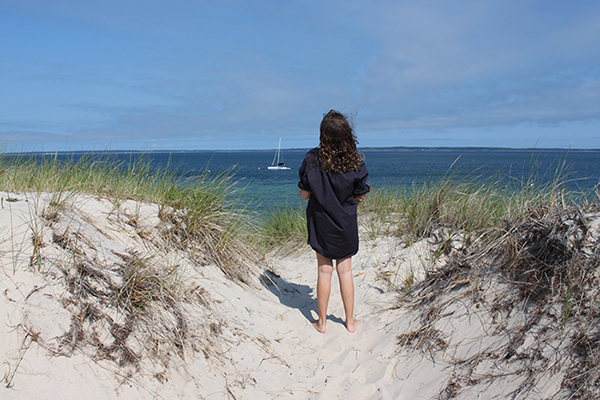
Later when I’m not tired I’ll make it be so you can click on a high-res version, this one is kinda lame but it busts the margins otherwise…
by Speranta Dumitru on June 2, 2014
Political theorists are much indebted to Joseph Carens for his 1987 article “Aliens and Citizens: the Case for Open Borders”. Written in a period of increased restrictions on migration, Carens’s article was pioneering in two ways: it introduced the migration question to political theory’s agenda and set the terms of the debate from the free movement side. Carens’s recent book, The Ethics of Immigration, is less pioneering. It explicitly aims to engage with the “conventional view of immigration” and to show that it can accommodate some measures which improve citizenship and admission policies. The open borders argument is not abandoned but is left to only one of the twelve chapters. Carens’s main concern, however, is to show that the open borders argument does not conflict with the measures he proposes.
It is possible to have the opposite concern: are the proposed measures a way to advance towards a world of open borders? In other words, is Carens still advocating open borders? My analysis here will be limited to the first measure he proposes in the book, this is that “justice requires that democratic states grant citizenship at birth to the descendants of settled immigrants” (p. 20). Whether justice requires this or not, many “democratic states” already conform to this principle and my argument is not that they should stop. Rather, my worry is that such an argument is not a way to advance towards an open borders world.
[click to continue…]
by Belle Waring on April 14, 2014
It’s cool that Chris and Ingrid were meeting up recently; Maria came here to have roti prata with me and John in Singapore just the other day. Maybe someday in the future perfect subjunctive all the CT authors could have met one another. Maybe someday we could all meet up at once and have a killer party! I would like it to be…on Ortygia in Syracuse, I think (the one in Sicily). It would be OK if it were in a different city too. HK would be cool. Mataram isn’t exactly a city, but it still might be nice to meet on Lombok somewhere. I took this photo on Lombok week before last, looking East off the Southwest coast. If it were clear and you looked to the left you could see Bali across the Lombok strait, three mountains one behind the other, about as big as the knuckle line of your fist held out at arm’s length. This is also the Wallace line, which divides Eurasian flora and fauna from Austronesian. Storms marching towards us across the marsh and then the river, and up the bluff, and then whiting out the screened porch with rain and then hammering the tin roof with a thousand pebbles taught me as a child that clouds get really full and black and then water up and falls out the bottom. It’s just science.
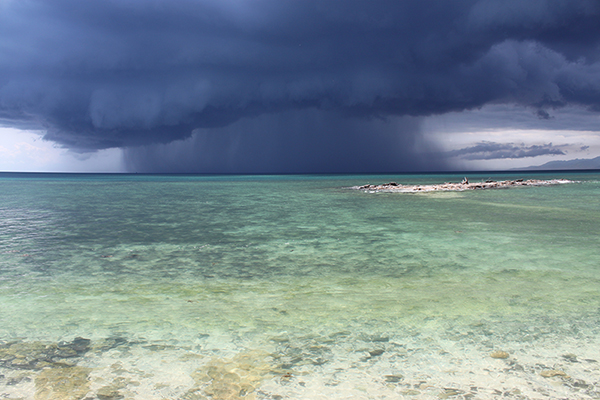
by Chris Bertram on August 8, 2013
The big item on this morning’s UK news (Guardian, BBC) is a report by the Chief Inspector of Borders and Immigration, John Vine, that is highly critical of the UK Border Force. Large sections of the report have been redacted, leading opposition politicians, such as Labour’s Chris Bryant, to accuse Home Secretary Theresa May and Immigration Minister Mark Harper of a “cover up”. What struck me about the report, though, was the basic failure in reporting by the news media, such that the ordinary reader or listener would really not understand the back story.
From the BBC report:
But inspectors found UK officials at Calais had stopped taking photographs and fingerprints of illegal immigrants in 2010 because of problems with the availability of cells to hold people in. This was also later stopped at Coquelles. Mr Vine said: “Gathering biometric information such as fingerprints could assist the decision-making process if these individuals were ultimately successful in reaching the UK and went on to claim asylum.”
The reporting follows the UK Home Office in stigmatizing people as “illegal” in advance of any judicial process, but it also fails to explain the background in the Dublin Regulation that states that people can only claim asylum in the first EU country they enter. This means that states in northern Europe, such as the UK, can disclaim responsibility for people fleeing persecution, just so long as they can show that the asylum seekers were previously present in another member state. This adds to armoury of extra-territorial checks (fines on carriers etc) that make it impossible for asylum seekers to reach the UK legally. Since most asylum seekers enter the EU through southern Europe (many dying in leaky boats in the Mediterranean), the Dublin Regulation effectively assigns responsibility to those states least able to cope (partly because of the Eurozone crisis) and where racism, xenophobia and violence towards foreigners is most marked. (There are regular horror stories about the suffering of asylum seekers in Greece.) A progressive policy would both recognize our humanitarian obligations towards refugees and put in place a mechanism for sharing that responsibility fairly across all EU member states. Unfortunately, rather than campaigning for such a policy, politicians of the “left” in northern Europe, like Bryant, use episodes like this to make a noise about “controlling our borders”.
by Jon Mandle on June 17, 2013
Several years ago, I was at a conference in Krakow. The organizers put together a couple of excursions for the participants. One was to the Wieliczka Salt Mine and one was to Auschwitz. I was with my wife and daughter who was 6 at the time, so we went to the salt mine. It was pretty spectacular, much better than in pictures, and I didn’t regret the decision. Several friends who went to Auschwitz described the experience in pretty much the same terms: they were glad that they had gone, but never wanted to go back. I recently was in Krakow again, and this time I took the drive – about an hour – out to the camp.
[click to continue…]







